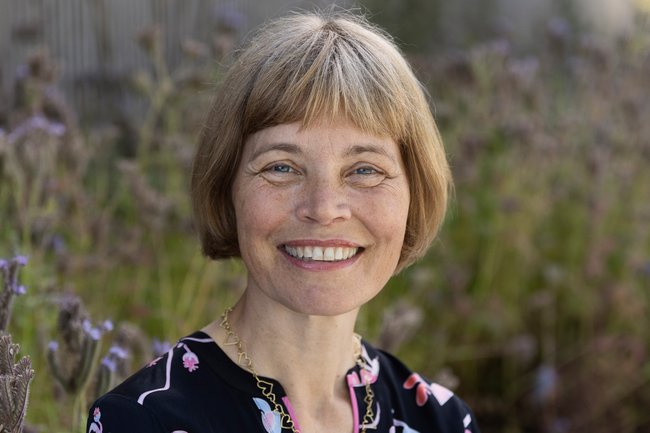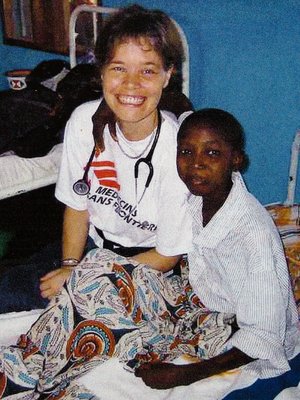Distinguished alumna 2022: Vibeke Brix Christensen

Pediatrician with passion and heart
She has provided care in the field in the midst of the world’s most horrific catastrophes. As a doctor and scientist, she has worked on the front lines of civil wars, natural disasters and epidemics and has witnessed enormous human suffering. Pediatrician Vibeke Brix Christensen is this year’s distinguished Aarhus University alum.
Under the brutal, dry heat of a merciless sun, the queue of sick, starving people in front of her continues to grow. Desperation hangs heavy in the air. A lot is at stake in this queue: it’s a matter of life and death. The woman facing the queue in a refugee camp in Darfur is Vibeke Brix Christensen. She’s far from the prosperity and order of Denmark, her home country. But she doesn’t care, because she isn’t here for her own sake. She’s here because she can’t stay away.
She recognises a mother in the queue who she’s already encountered several times. This time as before, she’s brought her little son with her. He’s very thin and weak: nothing but skin and bones. In fact, he’s even thinner than last time. And it’s his mother’s doing: she has been starving him deliberately. That’s because only the most acutely malnourished refugees can get aid. Vibeke Brix Christensen measures the circumference of the little boy’s upper arm. Under 11.5 cm. He’s in the danger zone. And that means he’s eligible for aid – along with the rest of his family. And he survives.
In all of the places Vibeke Brix Christiansen has been stationed, she has seen with her own eyes how much damage malnutrition does to children. And no treatment was available for children who were ‘only’ moderately malnourished. They suffered and got sick, and there was nowhere they could turn for help. So Christensen decided to do something about it. She contacted internationally recognised experts in nutrition in Denmark and abroad, and together they created the Treatfood project. She and a large team of researchers developed a recipe for a simple, cheap food supplement for the millions of children in the world who suffer from moderate acute malnutrition (MAL).
“Sometimes I’ve encountered the attitude that I ought to choose between academic work and humanitarian work. But I have chosen, and I’ve chosen both,” Christensen said.
Piglets help children with heart disease
AU’s 2022 distinguished alum grew up in Varde, a small town in western Jutland, with her two brothers. Her father is a veterinarian, and her mother is an occupational therapist. After finishing her medical training at the University of Southern Denmark, she moved to Aarhus for her doctoral studies. She spent a lot of her time at AU in the basement under Skejby Hospital, where she and her 17-member team learned worked to improve pediatric cardiac surgery techniques by operating on piglets.
"At Aarhus University, I encountered a high degree of professionalism and decency in the approach to our work – both in relation to people and animals. The research I did back then formed an important foundation and is still with me today. My PhD programme also taught me the value of respectful teamwork and interdisciplinarity, and I’ve relied on these values a lot in my career,” she said.
Christensen highlighted her supervisor at AU, Professor Else Tønnesen, as an important mentor and collaborator. Tønnesen supported Christensen when she – the first doctor in Denmark to do so – got a clause included in her employment contract that allowed her to take leaves of absence to do humanitarian work in the field.
“It was unique that I was given that opportunity in Aarhus, and I’m very grateful for that,” she said.
All children are equally valuable
Christensen has worked in the field as part of the Doctors Without Borders team several times in Sierra Leone, Darfur and Afghanistan. She has always worked in teams along with other international volunteers, in close collaboration with the local population; interdisciplinarity and respectful collaboration are core values. The Treatfood project was carried out in Burkina Faso. It involved 1,609 children, and was motivated by a desire to change the international guidelines regarding treatment of children with moderate acute nutrition to allow those children’s needs to be met.
“For me, the Hippocratic Oath doesn’t stop at the Danish border. All children are equally valuable, and I’ve always had a drive to do something. I’m fortunate that life has dealt me some cards that I can use to help others. This is how I can make a difference for people in need,” she said.
In 2002, the Danish TV show ‘The examination table’ (Lægens bord) visited Christensen in Sierra Leone. In one scene, she has to get up in the middle of the night because a heavily pregnant 13-year-old girl with preeclampsia has arrived at the clinic with cramps. Dressed in a white t-shirt with the MSF logo and scrubs, she preps for surgery in the primitive, dimly lit operating theatre where there’s a huge moth fluttering around. The pregnant girl is in great pain when she’s brought into the theatre. “It’s okay, it’s okay. Everything will be fine,” Christensen says soothingly as she fills a syringe and administers anesthesia. The girl survives the birth, and delivers two girls by C-section - both of whom also survive. The wails of newborn babies fill the room.
“That is just the best sound right now,” Christensen says to the camera, her voice full of relief.
This story ended well. But there are many others that don’t.
The clock is ticking, the heart is beating
Christensen has seen a lot of women die in childbirth. She has seen children die of malnutrition, and she has seen children die of diseases that shouldn’t be life-threatening. And she’s seen people who’ve had arms, legs and genitals chopped off in the bloody civil war.
Although the organisation is called ‘Doctors Without Borders’, there are limits. For Christensen as well.
“You can’t help everyone. You have to be happy about the people you helped, and then hope that the people you didn’t help will still be there tomorrow. If you focus on everyone you couldn’t get to, you’ll burn out.”
“The most important thing is to not to become indifferent and forget the causes that are closest to your heart. And you also have to remember your duty to bear witness and speak out when you encounter injustice and inhumanity,” she said.
There’s a song by the local rock musician Steffen Brandt that’s helped her get through some of her darkest hours:
The clock is ticking
Your heart is beating
The whole world out of its mind
So do something
Run for your life
So make the most of your time
Love each other
Christensen actually looked Steffen Brandt up once to thank him for the lyrics that have meant so much to her. He was touched, and asked if there was anything he could do.
“That led to us doing a small, intimate concert at Klejtrup Musikefterskole, and I spoke about my work with Doctors Without Borders. It was a fantastic experience,” Christensen remembered.
The Executioner in Susanne Bier’s film The Revenge
One of the most powerful experiences Christensen told me about was the story of ‘the executioner’. In Sierra Leone, dying pregnant women were sometimes brought to Christensen’s clinic: their stomachs had been cut open by soldiers in the civil war, so they could guess the sex of the fetuses ‘for fun’. One man in particular was notorious for these mutilations: The Executioner.
One day, he came to the hospital himself, on death’s door because of a mutilated leg. The hospital’s local personnel just stood there. And confused thoughts flew through Christensen’s head: Would I be a kind of accomplice in the next murder if I save the Executioner now? Do I even want to help him?
“So then I said that we should get started. I had to hold on to the fact that I had sworn an oath to help anyone who needs care,” she said. It was this experience that provided the inspiration for a scene in Susanne Bier’s 2010 film The Revenge. In the film, however, the doctor, whose name is Anton (played by Mikael Persbrandt), decides not to treat the Executioner and turns him over to the local population.
So make the most of your time
Christensen has seen things on the front lines of the world’s conflict zones that no one should have to witness. She is particularly angered and saddened when seriously ill children don’t get the help they need. Perhaps because she works so closely with the sickest children – and their parents – in her ‘day job’ as a pediatrician at Rigshospitalet in Copenhagen.
“Fortunately, we have a high standard of treatment in Denmark, and I draw on our collaboration across specialities, across departments and across the country in my clinical practice and in my research, both for children with liver conditions and in my work for Doctors Without Borders,” she stressed.
She hopes that her appointment as distinguished alum will send a message to AU’s current students: to stay true to the causes that are close to their hearts and use their skills where they make the greatest difference. The world needs engagement and passionate commitment:
“The Sustainable Development Goals set a clear course. But we have to act if we’re going to get there. So: Reach out. And do it with all your heart. Work together on the complex problems. So make the most of your time. So do something.”
